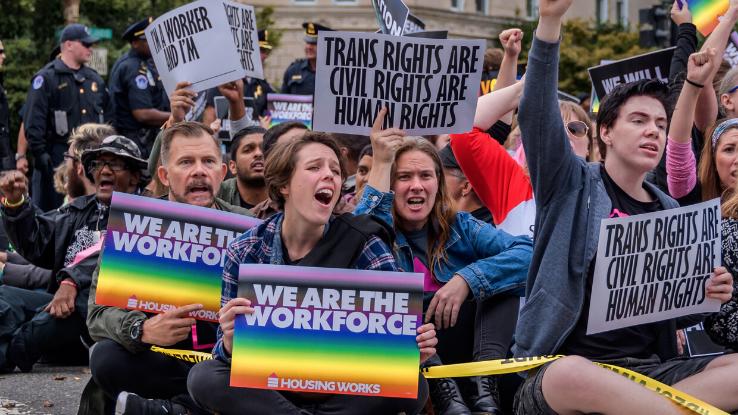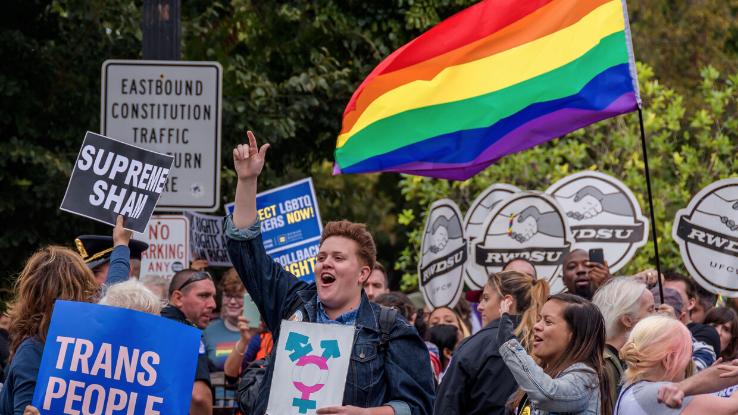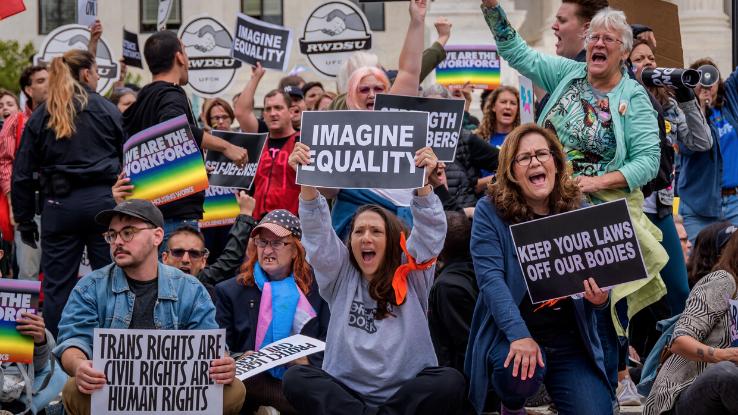Blue Collar Women Less Protected From Sexual Harassment Under Title Vii

In June 2020, the Supreme Court of the United States ruled that, under Title VII of the Civil Rights Act of 1964, LGBTQ+ workers are protected from workplace discrimination. For the 6-3 majority ruling, Justice Neil M. Gorsuch wrote, "An employer who fires an individual merely for being gay or transgender defies the law." For those unfamiliar with the Civil Rights Act of 1964, Title VII's language "bars employment discrimination based on race, religion, national origin and sex" — and, now, that language firmly applies to discrimination based on sexual orientation and gender identity.
The ruling is a landmark victory for many reasons, but chief among them is that this was the first major case that outrightly protected transgender rights. Before, it was legal in more than half of the states to fire workers for being gay, bisexual, transgender, or queer. That is, even though gay marriage has been the law of the land since 2015, LGBTQ+ folks in some states could get married over the weekend — and then fired on Monday, simply for living openly and truthfully with their same-sex spouse.
"This is a simple and profound victory for [LGBTQ+] civil rights," Columbia law professor Suzanne B. Goldberg told The New York Times. "Many of us feared that the court was poised to gut sex discrimination protections and allow employers to discriminate based on sexual orientation and gender identity, yet it declined the federal government's invitation to take that damaging path." However, all 50 states still recognize at-will employment. Though some have placed limitations on it — in Montana, there's just an initial six-month probationary period that's at-will — this decree can still be problematic. Let's break it down.
What Is At-Will Employment?
Never heard of at-will employment? Chances are, if you're employed in the United States, you're an at-will employee. The term is used in U.S. labor law and allows the employer to dismiss an employee for any reason and without warning — no "just cause" needed. In theory, this puts employees and employers on equal footing: Both can break off a working relationship without warning, but opponents of at-will employment point out that it leads to inequality of bargaining power. In essence, the power dynamic is still off, with the scales tipped in the employer's favor. So, if at-will employment is terminated, the other party has no legal recourse.

Of course, there are exceptions: Employers can't fire employees for a reason that's deemed illegal, i.e. an employee can't be fired for their race, religion, sex and all of the other classes protected by Title VII and the Americans with Disabilities Act. Additionally, employees can't be fired out of retaliation for performing a legally protected action (whistleblowing, filing harassment suits, etc.), nor can they be fired outside of the terms outlined in their contract. So, what's the problem with at-will employment? The reasons are numerous — not unlike the myriad absurd reasons for which an employee can be fired.
At the end of the day, there's no guarantee that at-will firing doesn't stem from employer prejudice. As Moshe Marvit points out in an article for The Courier by Casey Quinlan, "Unless you're a member of a union and there's a bargaining agreement that gives just cause, they could just say you're not a team player. You're not a fit." A May 2020 poll from Alexander Hertel-Fernandez, Data for Progress, and the Omidyar Network revealed that 68% of folks surveyed disagreed with the statement that "employers should be able to fire workers for any reason."

Those respondents aren't alone: From a New York Times op-ed that made a case for folks having "a legal right to your job" to Senator Bernie Sanders galvanizing the movement to create a national law against termination without "just cause," the momentum to end at-will employment seems to be growing.
Why is ending at-will employment a good thing for workers' rights? First off, if an employee is fired with no justification given, but they feel as though they were illegally discriminated against, it's up to that fired employee to prove the illegal termination. "After the worker makes out a case of discrimination, the employer can then point to another basis for the termination, benefiting from an at-will presumption that permits employers to fire workers for almost any or no reason," notes Data for Progress writer Jared Odessky. "In reality, employers can simply invent reasons after the fact. The burden then falls to the worker to show that the reason the employer gave was a lie."
In addition to removing this burden from employees, moving from an at-will employment system to one that requires "just cause" for termination would help employees come forward when they see harassment or other toxic and illegal behaviors in the workplace — they'll feel even more protected when they do so, knowing a cross employer won't fire them in a roundabout way for speaking out. Moreover, this new path would only fortify the hard-won civil rights outlined in Title VII, allowing LGBTQ+ employees — and all workers — to feel safe in the workplace.
russelllormeaving.blogspot.com
Source: https://www.reference.com/business-finance/workers-rights-title-vii-protections-at-will-employment?utm_content=params%3Ao%3D740005%26ad%3DdirN%26qo%3DserpIndex
Postar um comentário for "Blue Collar Women Less Protected From Sexual Harassment Under Title Vii"